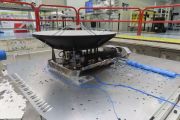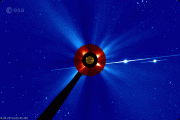
Copernical Team
Radio interference from satellites is threatening astronomy but there are solutions
 Visible light is just one part of the electromagnetic spectrum that astronomers use to study the universe. The James Webb Space Telescope was built to see infrared light, other space telescopes capture X-ray images, and observatories like the Green Bank Telescope, the Very Large Array, the Atacama Large Millimeter Array and dozens of other observatories around the world work at radio wavelengths
Visible light is just one part of the electromagnetic spectrum that astronomers use to study the universe. The James Webb Space Telescope was built to see infrared light, other space telescopes capture X-ray images, and observatories like the Green Bank Telescope, the Very Large Array, the Atacama Large Millimeter Array and dozens of other observatories around the world work at radio wavelengths Globalstar to Deliver 5G Private Networks and Services Powered by Qualcomm 5G RAN Platforms
 Globalstar, Inc. (NYSE American: GSAT), a leading telecom infrastructure provider, has signed a strategic collaboration agreement with Qualcomm Technologies, Inc. involving a portfolio of 5G Private Network technologies, including Qualcomm FSM 5G RAN Platforms for small cells, as well as select Qualcomm Snapdragon Modem-RF Systems, supporting Rel 15/16, that will utilize Globalstar Band n53 terr
Globalstar, Inc. (NYSE American: GSAT), a leading telecom infrastructure provider, has signed a strategic collaboration agreement with Qualcomm Technologies, Inc. involving a portfolio of 5G Private Network technologies, including Qualcomm FSM 5G RAN Platforms for small cells, as well as select Qualcomm Snapdragon Modem-RF Systems, supporting Rel 15/16, that will utilize Globalstar Band n53 terr Astronomers detect radio recombination lines of carbon oxygen ions for first time
 A research team from the Shanghai Astronomical Observatory (SHAO) of the Chinese Academy of Sciences has detected radio recombination lines (RRLs) of ions heavier than helium for the first time, using the TianMa 65-m Radio Telescope (TMRT). These lines were assigned to carbon and/or oxygen ions.
Ionized gas is the most widely distributed interstellar gas component and an important laborato
A research team from the Shanghai Astronomical Observatory (SHAO) of the Chinese Academy of Sciences has detected radio recombination lines (RRLs) of ions heavier than helium for the first time, using the TianMa 65-m Radio Telescope (TMRT). These lines were assigned to carbon and/or oxygen ions.
Ionized gas is the most widely distributed interstellar gas component and an important laborato Solved: The Mystery of the Cloudy Filters
 There's a mystery happening in some satellites facing the Sun, and scientists from the National Institute of Standards and Technology (NIST) and the Laboratory for Atmospheric and Space Physics (LASP) are on the case. The team has been trying to figure out what is clouding up and compromising the performance of tiny, thin metal membranes that filter sunlight as it enters detectors that monitor t
There's a mystery happening in some satellites facing the Sun, and scientists from the National Institute of Standards and Technology (NIST) and the Laboratory for Atmospheric and Space Physics (LASP) are on the case. The team has been trying to figure out what is clouding up and compromising the performance of tiny, thin metal membranes that filter sunlight as it enters detectors that monitor t Tracing 13 billion years of history by the light of ancient quasars
 Astrophysicists in Australia have shed new light on the state of the universe 13 billion years ago by measuring the density of carbon in the gases surrounding ancient galaxies.
The study adds another piece to the puzzle of the history of the universe.
"We found that the fraction of carbon in warm gas increased rapidly about 13 billion years ago, which may be linked to large-scale hea
Astrophysicists in Australia have shed new light on the state of the universe 13 billion years ago by measuring the density of carbon in the gases surrounding ancient galaxies.
The study adds another piece to the puzzle of the history of the universe.
"We found that the fraction of carbon in warm gas increased rapidly about 13 billion years ago, which may be linked to large-scale hea Can artificial intelligence help find life on Mars or icy worlds?
 Wouldn't finding life on other worlds be easier if we knew exactly where to look? Researchers have limited opportunities to collect samples on Mars or elsewhere or access remote sensing instruments when hunting for life beyond Earth. In a paper published in Nature Astronomy, an interdisciplinary study led by SETI Institute Senior Research Scientist Kim Warren-Rhodes, mapped the sparse life hidde
Wouldn't finding life on other worlds be easier if we knew exactly where to look? Researchers have limited opportunities to collect samples on Mars or elsewhere or access remote sensing instruments when hunting for life beyond Earth. In a paper published in Nature Astronomy, an interdisciplinary study led by SETI Institute Senior Research Scientist Kim Warren-Rhodes, mapped the sparse life hidde Flat, pancake-sized metalens images lunar surface in an engineering first
 Astronomers and amateurs alike know the bigger the telescope, the more powerful the imaging capability. To keep the power but streamline one of the bulkier components, a Penn State-led research team created the first ultrathin, compact metalens telescope capable of imaging far-away objects, including the moon.
Metalenses comprise tiny, antenna-like surface patterns that can focus light to
Astronomers and amateurs alike know the bigger the telescope, the more powerful the imaging capability. To keep the power but streamline one of the bulkier components, a Penn State-led research team created the first ultrathin, compact metalens telescope capable of imaging far-away objects, including the moon.
Metalenses comprise tiny, antenna-like surface patterns that can focus light to SpaceX CRS-27 delivers truck load of research projects to ISS
 NASA's 27th SpaceX commercial resupply services (CRS) mission is scheduled to launch to the International Space Station from the agency's Kennedy Space Center in Florida in March. The scientific experiments and technology demonstrations carried by the uncrewed Dragon spacecraft examine how the heart changes in space, test a student-designed camera mount, compare surfaces that control biofilm for
NASA's 27th SpaceX commercial resupply services (CRS) mission is scheduled to launch to the International Space Station from the agency's Kennedy Space Center in Florida in March. The scientific experiments and technology demonstrations carried by the uncrewed Dragon spacecraft examine how the heart changes in space, test a student-designed camera mount, compare surfaces that control biofilm for Japan's new H3 rocket fails to reach orbit, self-destruct command issued
 On Tuesday, Japan's next-generation H3 rocket failed after liftoff, prompting the space agency to issue a destruct command after concluding that the mission could not be completed.
The H3 successfully launched after a failed attempt last month when the vehicle's two solid rocket boosters failed to ignite as planned, and aborted right at liftoff.
Mitsubishi Heavy Industries (MHI) laun
On Tuesday, Japan's next-generation H3 rocket failed after liftoff, prompting the space agency to issue a destruct command after concluding that the mission could not be completed.
The H3 successfully launched after a failed attempt last month when the vehicle's two solid rocket boosters failed to ignite as planned, and aborted right at liftoff.
Mitsubishi Heavy Industries (MHI) laun Virgin Galactic to renew Spaceplane Flights
 Virgin Galactic has completed improvements to its VSS Unity spaceplane. The company plans to restart a passenger flight program this year, the company said Tuesday.
Virgin Galactic suspended flights of the Unity and its carrier plane, the VMS Eve, in 2021 to work on the craft. The VSS Unity launches from the surface of the Eve after that plane carries the spacecraft up.
Virgin Galact
Virgin Galactic has completed improvements to its VSS Unity spaceplane. The company plans to restart a passenger flight program this year, the company said Tuesday.
Virgin Galactic suspended flights of the Unity and its carrier plane, the VMS Eve, in 2021 to work on the craft. The VSS Unity launches from the surface of the Eve after that plane carries the spacecraft up.
Virgin Galact 



































